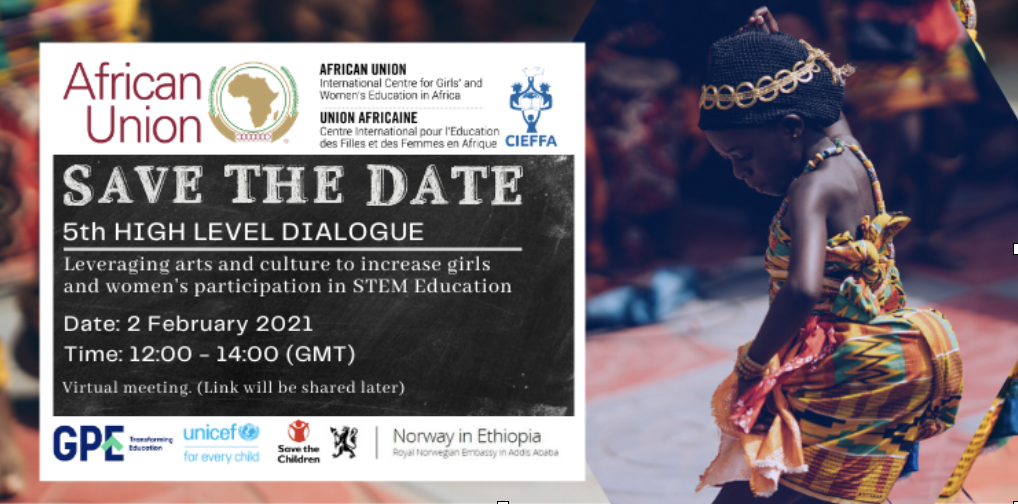The African Union International Centre for Girls’ and Women’s Education in Africa (AU/CIEFFA) in collaboration with the AUC Department of Social Affairs, Global Partnership for Education (GPE), UNICEF, Save the Children, UNESCO and the Royal Norwegian Embassy in Addis Ababa will host the 5th High Level Dialogue (HLD) on Gender Equality in Education on the 2nd of February 2021 under the theme “Leveraging arts and culture to increase girls’ and women’s participation in STEM Education”.

What is the role of the Arts & Culture in STEM Education & how can we leverage it to encourage more African girls & women to take up STEM?
Only 35% of university STEM students are women. How can art and culture be used to encourage more girls to pursue STEM-related fields?
 Arts, culture, heritage and education are inherent to the socio-economic fabric of African societies. How can they be used to promote the uptake of STEM by young girls?
Arts, culture, heritage and education are inherent to the socio-economic fabric of African societies. How can they be used to promote the uptake of STEM by young girls?
AU/CIEFFA 5th High Level Dialogue Registration
Description
An online event dedicated to looking into the different approaches that AU Member States can take to transform the process of teaching and learning and encourage girls and women to take up STEM studies in school through arts, culture and heritage.
When: Tuesday, February 2, 2021
Time: 12:00 -14:00 GMT / 13:00 - 15:00 CET / 07:00 - 09:00 EST
Moderator: Dr. Rita Bissoonauth, Head, African Union/International Center for Girls and Women’s Education in Africa (AU/CIEFFA)
Speakers:
• H.E Hon. Uhuru Kenyatta, President of the Republic of Kenya
•H.E. Prof Sarah Agbor Anyang, AUC HRST Commissioner
•H.E. Ms Amira Elfadil, AUC Social Affairs Commissioner
•Ms. Alice Albright, CEO Global Partnership for Education
•Hon. Dag Inge Ulstein, Minister of International development, Norway
•Hon. Youssou N’Dour, Artist, Former Minister of Culture of Senegal and GPE Champion
•Hon. Mabuza Lady, Minister of Education & Training, Eswatini
•Hon. Ginette Amara Ali Mazieki, Ministre de la Recherche scientifique et de l'Innovation Technologique, CAR
•Hon. Elise Ilboudo Thiombiano, Minister of Arts, Culture and Tourism, Burkina Faso
•Ms. Doris Mpounou, Director and AU Representative, Save the Children International
•Dr. Edward Addai, UNICEF Representative to the AU & ECA
•Adanna Nwagagbo, youth leader, Nigeria
This event is being co-hosted by the AU/CIEFFA, AUC Department of Social Affairs and the Global Partnership for Education, with support from the Royal Norwegian Embassy of Addis Ababa as well as UNESCO, UNICEF and Save the Children.
Join us for AU/CIEFFA’s 5th High Level Dialogue where we will look at how the arts, culture and heritage can be leveraged to encourage more girls to pursue studies and careers in STEM.
Register here for the February 2 event:
https://worldbankgroup.zoom.us/webinar/register/WN_L_Z2KVZ8R5uvP4mhzYh55w
The HLD will take place on Zoom and broadcast live on the African Union YouTube channel from 12:00 pm - 14:00 pm (GMT).
How can you support us?
1. Register in advance for this webinar: http://bit.ly/39mR0jn
2. Join the conversation using the official hashtag: #CIEFFAHLD on Twitter, Facebook and Instagram.
3. Like and follow the official handles (see the list below).
4. Post and/or tweet by using/adapting the posts given in this briefing. Of course, adapt the post to reflect your own priorities and contexts as required. Encourage your followers to do the same.
5. Share Media Advisory on your website/events pages and social media pages, and tag journalists you know.
Live Broadcast Link
● YouTube: African Union









